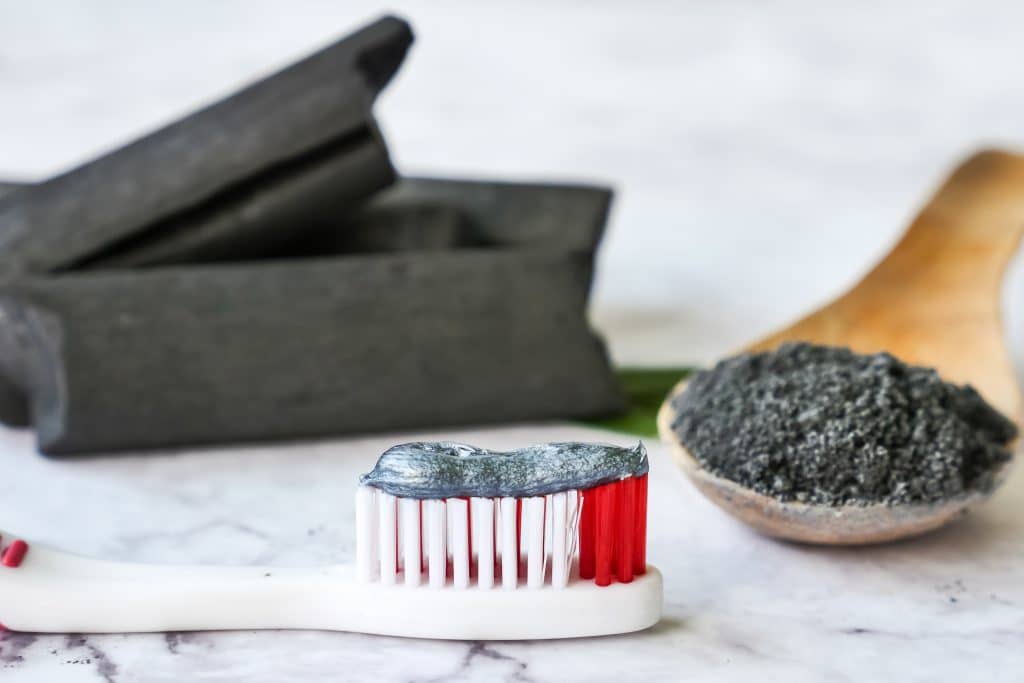From at-home face masks to bars of soap, activated charcoal is making its way into numerous beauty and self-care products. Let’s be clear: activated charcoal is not the same as the black bricks dad used to ignite the grill. We’re talking about a form of carbon that has been proven to detoxify certain areas of the body from the inside out. If the ingredient can be used in supplement pills and a face wash sponge, why not toothpaste?
Whether you’ve seen the bizarre-looking videos of people scrubbing their teeth with a black paste or you’ve had success with activated charcoal in other products, you may be curious as to whether charcoal toothpaste will make your teeth whiter.
What Is Activated Charcoal?
Activated charcoal, like the kind you’d find in a water filter, is a form of treated carbon. The product is made of coal, coconut shells, olive pits, and other materials. Once the ingredients are combined, the substance is reheated, which activates it. It has a porous surface that collects other particles, like dirt and oil. It absorbs the particles you wouldn’t want on your face or in your water or body and flushes them out when the activated charcoal is removed.
Charcoal toothpaste uses that same technique to help remove stains. Theoretically, it binds to your teeth, collecting everything in its path – stains, bacteria, tartar and more. When you rinse away the charcoal toothpaste, ideally, the stains wash away too.
Is Charcoal Toothpaste Safe?
While many users of the paste argue it’s done wonders for whitening their smile, there are a few downsides to charcoal toothpaste. Like many over-the-counter teeth whitening products, the ingredients used in some charcoal toothpastes can be abrasive and damage the enamel of your teeth. If used regularly, the paste could weaken the enamel, increasing sensitivity and ultimately causing pain when you consume hot or cold beverages.
Secondly, activated charcoal tends to absorb nearly everything with which it comes into contact. That’s good when you want the product to remove stains, but it can be harmful if the product absorbs things like medicine or vitamins.
Lastly, charcoal toothpaste isn’t a reliable teeth whitening system for a long-term glowing smile. As with whitening pens, strips and mouth rinses, the active ingredient isn’t applied to the teeth long enough to remove aged stains.
While charcoal toothpaste does have the power to show some whitening effects, the product isn’t the answer for a long-lasting change. One notable benefit many users offer is that it kills bacteria that causes bad breath, so for some, the benefits can be found beyond whitening.
Does Charcoal Toothpaste “Detoxify” My Mouth?
Some charcoal toothpaste products claim the activated charcoal will detoxify or cleanse your mouth of bacteria. As mentioned with the limited effects of lifting stains, the activated charcoal is only in your mouth for a short period of time. The “detoxifying” process claimed by some pastes won’t work any better than what you find with your normal toothpaste. Severe toxins, like those absorbed by your kidneys or liver, aren’t typically found in the mouth anyway. If your concern is with ongoing bad breath or an ill taste in your mouth, speak with your Shelton dentist about the issue. There could be underlying problems, like tooth decay, causing the foul odor.
Charcoal Toothpaste vs. Teeth Whitening
Overall, charcoal toothpaste is good at removing surface stains, but not for whitening teeth. The best teeth whitening solution is found with your Bridgeport / Trumbull Line dentist. Dental whitening treatments, like Zoom chairside whitening system offered by DeJesus Dental Group, uses a combination of hydrogen peroxide gel and a special light to activate the stain-removing gel. There’s no waiting period as with over the counter products. Once the gel is removed, your whiter, more brilliant smile is revealed. In addition, dental whitening treatments give you lasting results. One treatment will last for months before a follow-up visit is needed.
Should I Use A Charcoal Toothbrush?
A charcoal toothbrush looks exactly like a regular toothbrush, only the bristles are black. The bristles are infused with activated charcoal. The idea is that the charcoal bristles will absorb the bacteria from your mouth rather than just pushing it around. While some report using the charcoal toothbrush does help lift surface stains – like those from wine, coffee and tea – there are potentially negative impacts of this relatively new product as well.
Like charcoal toothpaste, the brush’s impact is limited because of the short amount of time it’s used on the teeth. In addition, the brush is said to remove fewer stains than the charcoal toothpaste. The bigger issue with a charcoal toothbrush is that limited information is available on its positive or negative impact, so using the product could pose a health risk that we’re not yet aware of.
If you want to try a charcoal toothpaste in your oral hygiene routine, your best first move is to schedule a consultation with your Bridgeport / Trumbull Line dentist or ask about it during your next routine cleaning. The use of activated charcoal in the dentistry world is relatively new, so there may be risks you shouldn’t take. If your dentist recommends you avoid the charcoal-infused product, ask about dental whitening treatments that offer better, longer-lasting results. If you’re already using a charcoal toothpaste, use the product intermittently with your regular paste. Avoid tooth sensitivity issues by only using the charcoal toothpaste every two to three days.
Charcoal toothpaste should not be used in place of regular toothpaste. Your regular paste contains fluoride necessary to ward off dental decay and cavities. Keep your regular toothpaste as part of your daily dental routine.
The caring team at DeJesus Dental Group will be happy to meet with you for a routine cleaning and explain your options when it comes to creating a white smile. Whether you opt for the Zoom dental whitening procedure or use the take-home trays, you’re sure to experience the whiter teeth you want without the black mess of charcoal toothpaste.

